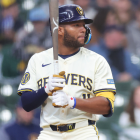When Carlos Beltran parted ways with the New York Mets on Thursday, he became the third manager to lose a job this week in the fallout of the Houston Astros' sign-stealing scandal, joining A.J. Hinch and Alex Cora (Boston Red Sox). Add in the team-level sanctions levied against the Astros (a $5 million fine and forfeiture of four draft picks), the season-long suspension of former Houston general manager Jeff Luhnow, and the all-encompassing (and justified) paranoia concerning almost everything Astros-related, and Major League Baseball has had a chaotic and unusually engaging mid-January week.
The root of all this traces back to mid-November, when The Athletic's Evan Drellich and Ken Rosenthal reported on allegations concerning the Astros' sign-stealing operation. Former Astros pitcher Mike Fiers, now with the Oakland Athletics, was the only player with firsthand knowledge of the scheme who spoke on the record, cementing himself as the "whistleblower" in the story. Fiers has since faced criticism from all corners, including, most recently, Jessica Mendoza, who works for the Mets and ESPN.
The brickbats thrown Fiers' way tend to be of the same composition: the implication that the Right Way to handle things would have been to go to Astros management; or, that he violated a code by speaking out against his ex-teammates. There's the idea, too, that Fiers is a hypocrite who was OK with the cheating when he benefited (he has a World Series ring that is owed, to some unknowable degree, to the operation), but turned coat upon changing hats.
In some there lurks more resentment for Fiers -- and for whistleblowers in general -- than for those who committed and maintained the unethical behavior without reservation or regret.
The criticisms miss that Fiers was (and is) risking what remains of his career -- baseball, as with other professional sports, is not above blackballing individuals -- and his privilege to then enjoy a quiet retirement. He's instead opened himself up to lifelong critique and debridement from strangers, including those who, in possession of a Houston area code, would have regarded him with the same warm fuzzies associated with most championship-squad members.
Those disses -- and they're similar to those tossed at whistleblowers in other arenas -- also miss that people like Fiers, who are willing to trade comfort for justice, are necessary for an honest society. It's easy to understand why others fell in line or stayed silent, even though players admitted to the league during its investigation they knew what they were doing was wrong. There are disincentives for coming forward, systemically and socially, for doing the just thing in the face of unethical behavior. Yet it's almost always necessary to enact real change. Had Fiers remained anonymous, the league may have ignored his comments instead of launching a probe following significant public pressure, as former big-league pitcher CJ Nitkowski tweeted on Thursday.
Why did Fiers speak now, instead of years ago? It's not hard to understand. The forces and impulses compelling people to question his motives are the same that make it hard for individuals to come forward in the first place. Fiers had to overcome those, and he likely did so by listening to other forces and impulses -- call it his conscience, his better angels, whatever; those should be the ones touted and prioritized in the years to come. Why not go to the Astros' leadership first? Hinch, by his own admission, damaged a few monitors. The front office, meanwhile, was led by actors who regularly crossed the lines for their own benefit.
Of course, it doesn't help that this an era where crossing the ethical and moral lines are met with indifference -- or, arguably as frequently, justification.
The Los Angeles Dodgers have every right to wonder how the 2017 and 2018 World Series would have played out if the Astros and Red Sox were on the up and up, but outsiders have every right to wonder about the Dodgers' purity given they're the team under investigation by the Department of Justice for improper behavior on the international free-agent market. The Dodgers shouldn't be singled out in that regard; teams regularly skirt the rules on the international market by agreeing to terms with literal children. Even domestically, teams who suppress their players' salaries are praised for their efficiency or excused for their conformity -- "everyone does it," or "it's not technically against the rules," are trotted out in defense as often as a left-handed specialist on a Tony La Russa-managed team.
Fiers isn't perfect, but that isn't the standard. What he is, really, is someone who was tasked with navigating an immoral and unethical maze. He chose to speak up when his silence would have been accepted and more beneficial for his career and his livelihood. Fiers won't be knighted or sainted; he should be appreciated, however, for he restored part of baseball's integrity.






















